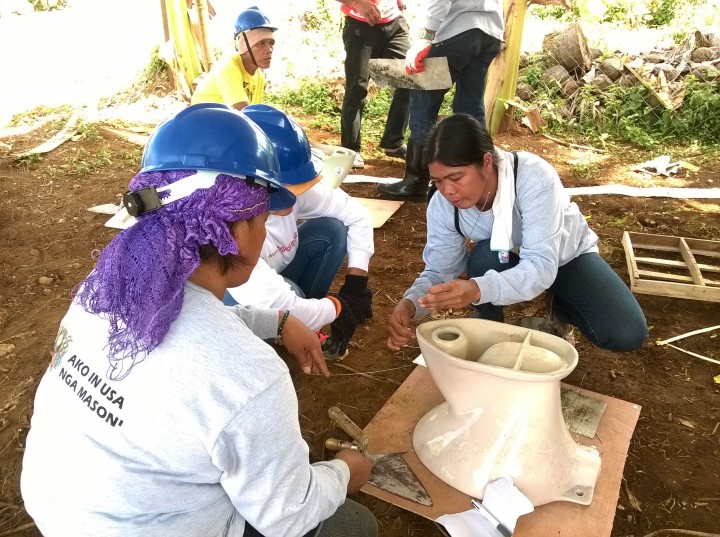Purpose
Using a WASH and Markets approach to improved public health and disaster preparedness to provide an alternative and sustainable model for access to services
Activities
The Wash and Markets (WHAM) approach integrates market-based principals to further WASH goals by supporting beneficiaries to enable them to procure affordable WASH goods and services, strengthening suppliers/traders and service providers of WASH products/services and strengthen the market to increase commercial opportunities for market actors.
Finding good quality builders was relatively easy, but Oxfam helped them to re-design the toilet products available, making them more cost efficient to produce and increasing the number of options available.
Oxfam approached Barangay Health Workers to serve as sales agents for the toilets. The health workers were already familiar with the communities Oxfam was working in and the families living there. The health workers discussed the importance of having a good toilet with the families and explained how they could purchase one, linking them to a local builder.
Oxfam worked with the Department of Social Welfare and Development through their Sustainable Livelihood Program Associations (SLPA). SLPAs took on the role of distributing materials they could benefit from bulk purchase discounts by identifying which suppliers had the best prices in each location.
Oxfam developed a partnership with Bayan Academy to provide the toilet builders and the sales agents with all the training they needed to help them run successful small businesses, focusing on product quality, financial management, marketing, sales and customer service.
The other major component of Oxfam’s new approach was to tackle the affordability aspect of buying a toilet. Microfinance Institutions (MFIs) specialise in providing relatively small value loans to customers that would not normally be able to get a personal loan through a commercial bank. There are several MFIs operating in the Philippines, all with large customer bases. The Cebu People’s Multi-Purpose Cooperative (CPMPC) was identified as being a suitable MFI partner. Oxfam worked with CPMPC to develop both a toilet loan product and a savings account product that were suitable for low-income families.
The Department of Social Welfare and Development provides financial support to the most vulnerable families in the form of subsidies. These are intended to help families with health related expenditures. Oxfam worked with DSWD to enable these subsidies to be paid directly into a toilet savings fund for eligible families, giving them the extra support needed to be able to buy a toilet themselves from the products available to everyone else.
Images

Image: Liezel, a builder from Bantayan Island training more builders in Guiuan, Eastern Samar © R Ramos - Oxfam
Countries of activity
Location of main activity
Objectives
Access to sanitation was low before Typhoon Haiyan that struck in 2013. Septic tanks, if existing, often discharge without treatment into drainage systems, and open defecation remains a major health risk. Oxfam has worked with micro-finance institutions (MFI) to develop affordable products to enable households can construct their own latrines, while enabling access to savings and insurance mechanisms.
Another element is market facilitation, to link the suppliers of services to MSMEs or local authorities to ensure products are available even remotest areas, while also giving them the Business development support they needed to develop their products and services.
Further information
Since the project’s completion the model has formally been adopted by CPMPC and its still being implemented without Oxfam’s support.
Contact information
Rona Ramos
Login to see the e-mail-adress of the contact person.
Filter tags
East Asia & Pacific Enabling environment and institutional strengthening Market development Specific to one or several countries
















